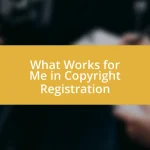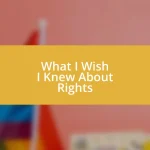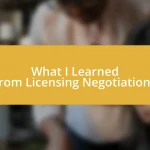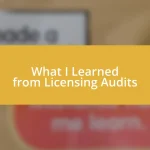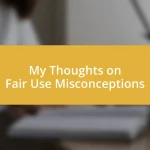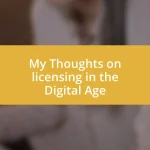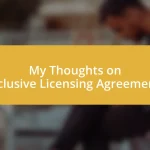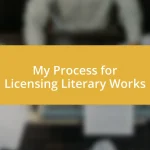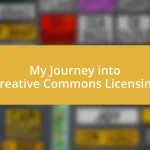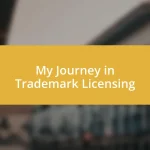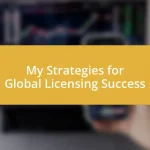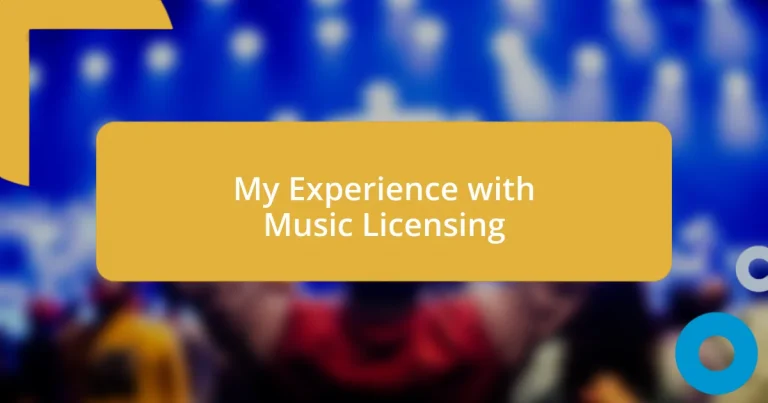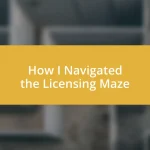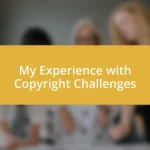Key takeaways:
- Understanding different types of music licenses (mechanical, sync, public performance, etc.) is crucial to avoid costly mistakes and ensure proper usage rights.
- Building relationships with rights holders and maintaining clear communication can simplify the licensing process and foster collaboration.
- Staying organized with licensing documents and being transparent about budgets can enhance efficiency and reduce stress during projects.
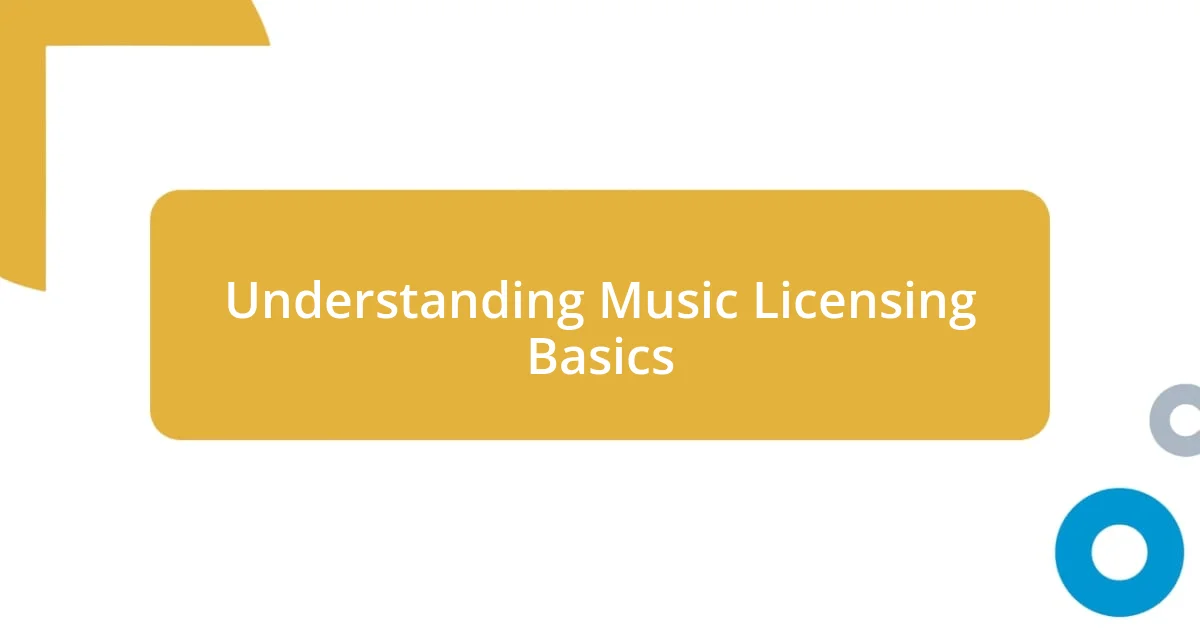
Understanding Music Licensing Basics
Understanding music licensing can feel overwhelming at first, but let me tell you, it’s an essential part of navigating the music industry. When I first started out, I remember being confused by terms like “sync licensing” and “public performance rights.” It was only when I realized that these licenses ensure artists are compensated for their work that everything clicked.
One particular instance sticks with me. I was collaborating on a short film, and we faced a big hurdle obtaining the rights to a popular song. The delay left a pit in my stomach, making me question if we’d ever finish the project. This experience reinforced the importance of securing proper permissions from the get-go. Have you ever faced similar challenges?
As I delved deeper, I found that understanding the different types of licenses—like mechanical and synchronization—was crucial. Mechanical licenses allow reproducing music on physical formats, while sync licenses let you use music in visual media. It’s fascinating how these little details can make or break a project. Wouldn’t it be exciting to create something knowing you’re backing it up with the right legal framework?
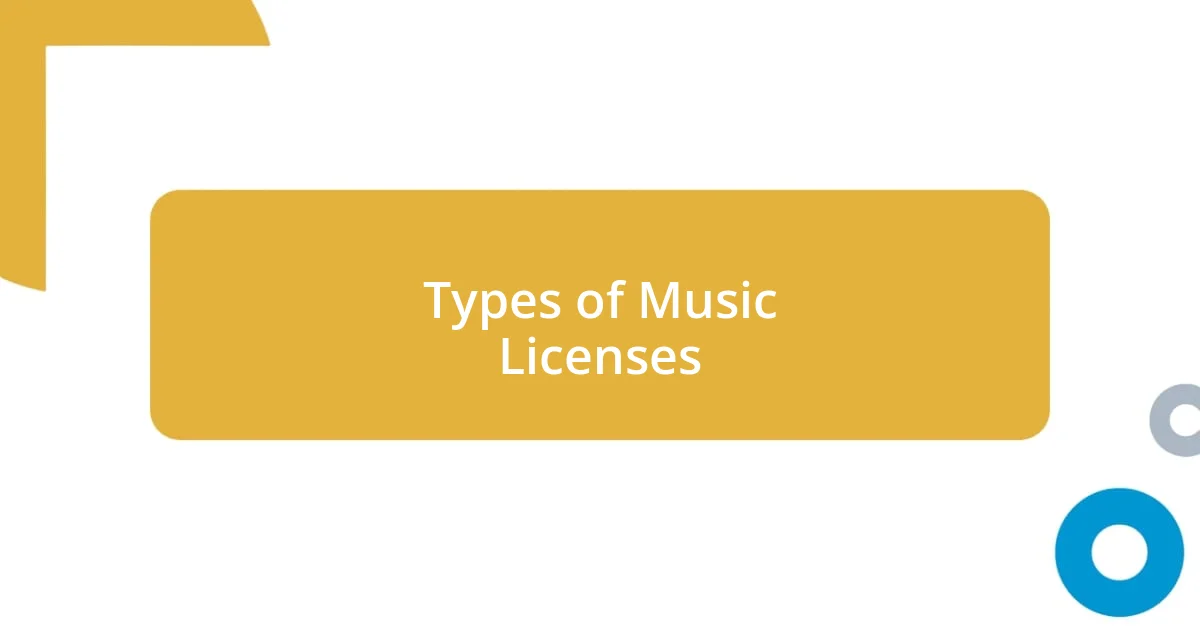
Types of Music Licenses
When I first dipped my toes into music licensing, I was surprised to learn about the variety of licenses available. Each type serves a specific purpose, and not understanding them can lead to costly mistakes. For example, I once used a song in a marketing video without securing the right license, which led to a cease-and-desist notice that was a wake-up call for me. Now, I always make it a point to know exactly what type of license I need before starting any project.
Here’s a breakdown of some common types of music licenses:
- Mechanical License: Allows for the reproduction of music on physical formats like CDs and vinyl.
- Synchronization License (Sync License): Needed for using music in film, TV shows, or any visual media.
- Public Performance License: Required for playing music in public venues, such as restaurants and live events.
- Master Use License: Grants permission to use a specific recording of a song, separate from the underlying composition.
- Non-Exclusive License: Allows multiple parties to use the same piece of music without exclusivity.
- Exclusive License: Grants exclusive rights to one party, preventing others from using the same music.
Understanding these licenses has profoundly shaped my approach to music projects. It feels empowering to be equipped with this knowledge, preventing headaches down the road. Just recently, I had to apply for a public performance license for an event, and the confidence I felt in navigating the paperwork made all the difference.
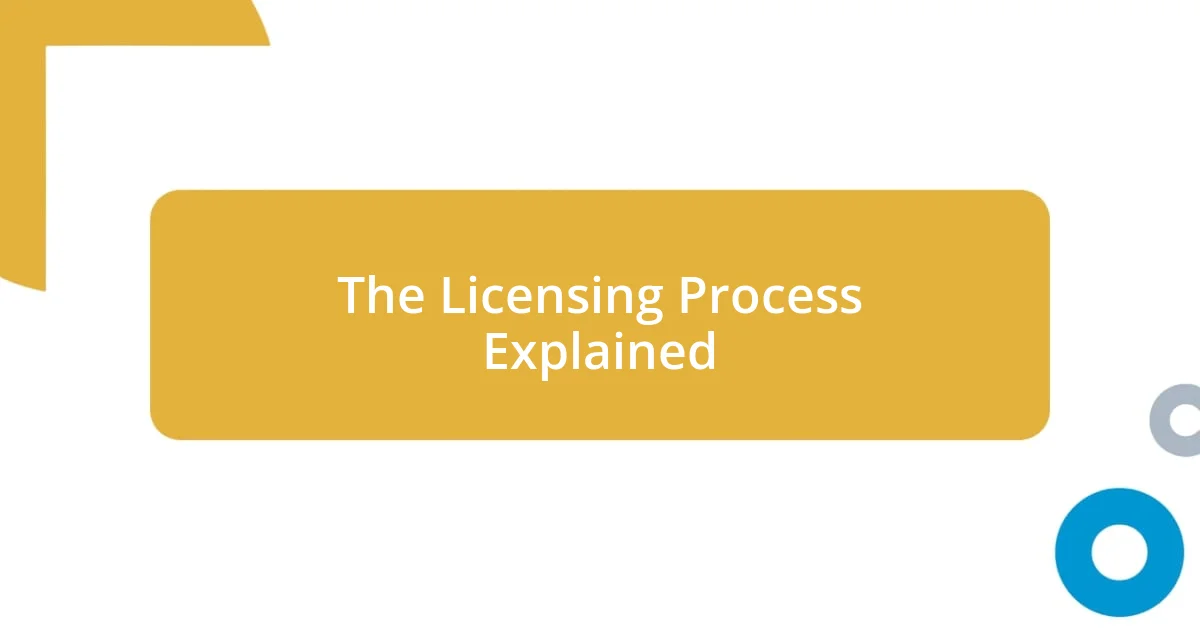
The Licensing Process Explained
When I first navigated the music licensing process, it felt like stumbling through a maze. Each step—identifying the song, contacting the rights holder, negotiating terms—was an intricate dance. I vividly recall my initial attempt to license a track for a promotional video. I reached out to the artist directly, and while I was anxious about the response, I was pleasantly surprised by their enthusiasm and willingness to collaborate. This experience taught me that the licensing process is not just about paperwork; it’s about building relationships too.
As I continued my journey, I learned that understanding the timeline is crucial. Initially, it took me weeks to secure licensing for a project. I remember feeling frustrated, especially when deadlines loomed around the corner. Now, I plan ahead, anticipating potential delays. Reaching out early and being clear about my intentions has made a world of difference. It’s funny how a little foresight can turn a stressful situation into a smoother experience—don’t you think?
Here’s a comparison of the key steps involved in the music licensing process against their typical timelines:
| Step | Typical Timeframe |
|---|---|
| Identify the Song | 1-2 days |
| Contact Rights Holder | 1 week |
| Negotiate License Terms | 1-2 weeks |
| Receive and Sign Contract | 3-5 days |
| Finalize Payment | 1-2 days |
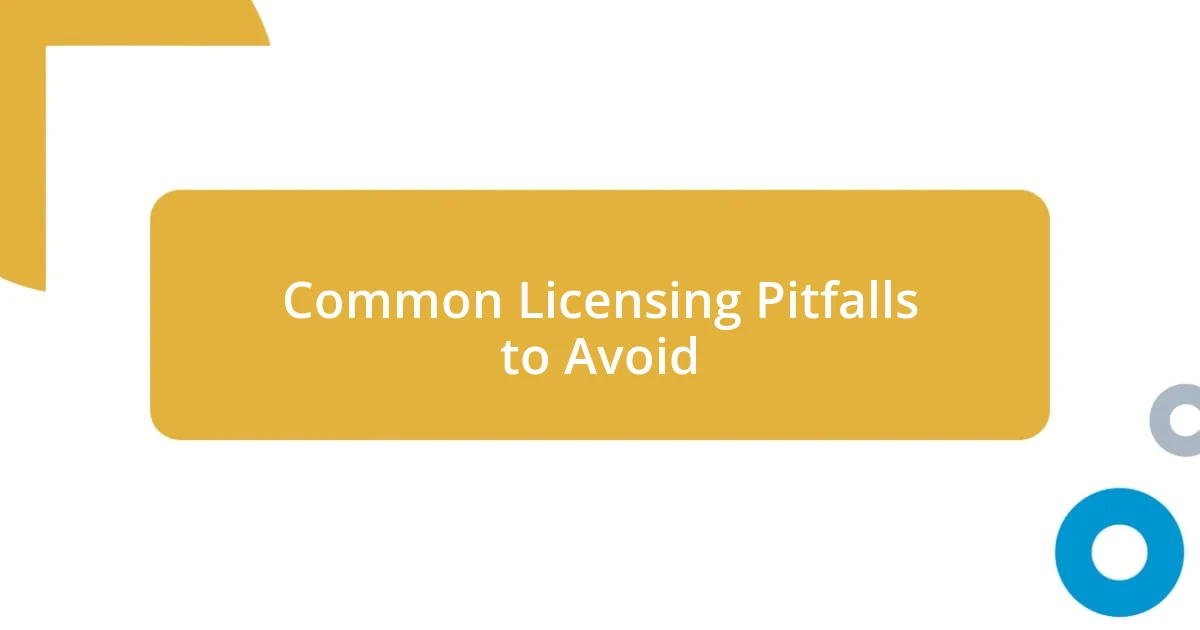
Common Licensing Pitfalls to Avoid
It’s all too easy to overlook the details when diving into music licensing. I once hurriedly assumed that using a popular song in my project was safe because it was readily available online. That misstep cost me not only time but also a hefty fine. Always verifying the origin of the music and its licensing status is essential to avoid such painful mistakes.
Another common pitfall is miscommunication with rights holders. I remember a frustrating moment when I thought I had secured a license, only to find out the terms were vague and allowed for different interpretations. I learned the hard way that being specific and detailed in negotiations—and getting everything in writing—can prevent misunderstandings that could derail your project.
Lastly, there’s the danger of neglecting to track your licenses. I once had a big event where I failed to keep proper records of the licenses I had obtained. As the music started playing, a wave of anxiety hit me. If you don’t keep a solid record, you risk legal issues down the line. Creating a dedicated filing system has become my safeguard, ensuring that I’m covered and confident for every project from the get-go.
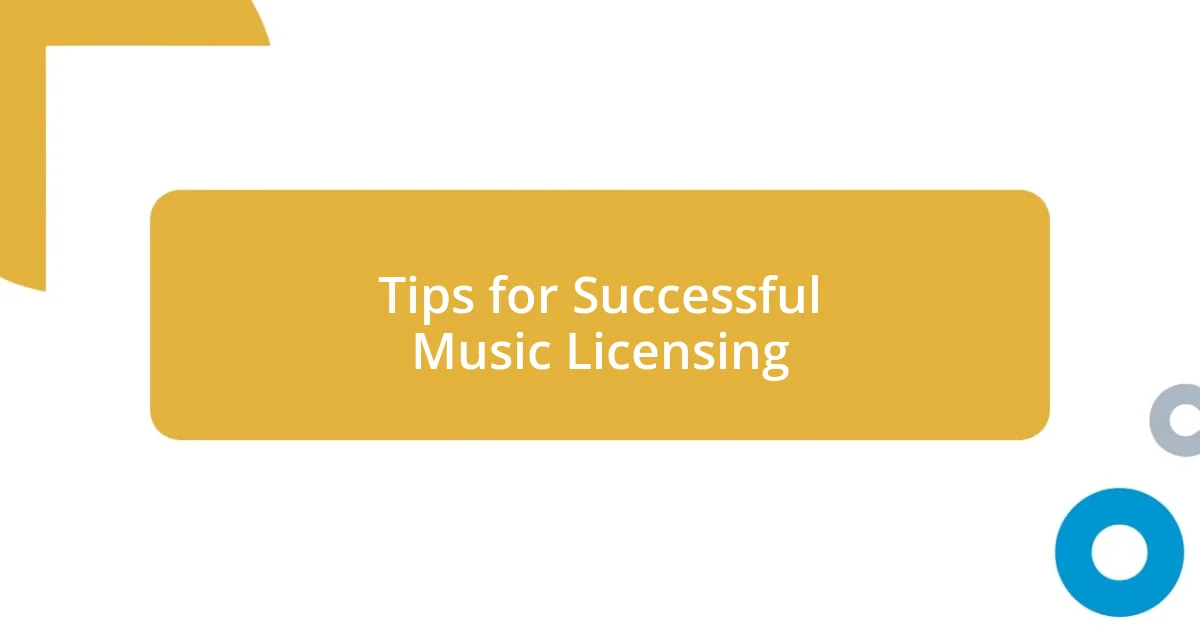
Tips for Successful Music Licensing
When it comes to successful music licensing, one of the most important tips I can share is to maintain open communication with rights holders. I recall a time when I emailed a rights holder with a simple question about usage rights and received a flood of helpful feedback in return. That interaction not only clarified the terms but also created a rapport that made future negotiations smoother. Have you ever struck up a conversation with someone and realized just how much easier the process becomes? Building these relationships can lead to a more collaborative atmosphere, which is always beneficial.
Another key aspect is to know your budget and be transparent about it. I learned this lesson the hard way when I expressed interest in a track that was far outside my price range. The rights holder was genuinely sympathetic but ultimately could not accommodate me. After that experience, I started being upfront about my budget right from the beginning. This not only saved me time but also fostered more honest discussions around what was feasible. Have you considered how money talk impacts your projects? It can be a game-changer!
Lastly, stay organized. I can’t stress enough the importance of keeping all your licensing documents in one place. Early on, I found myself scrambling through countless emails and files for a license I needed to present. The sheer panic I felt when I realized I couldn’t find it was overwhelming. Now, I dedicate a specific folder in my digital workspace for licensing documents, complete with a checklist for each project. It might seem simple, but having everything documented gives me peace of mind and allows me to focus on the creative aspects instead. Isn’t it wonderful when the logistics work seamlessly so you can concentrate on what you love?
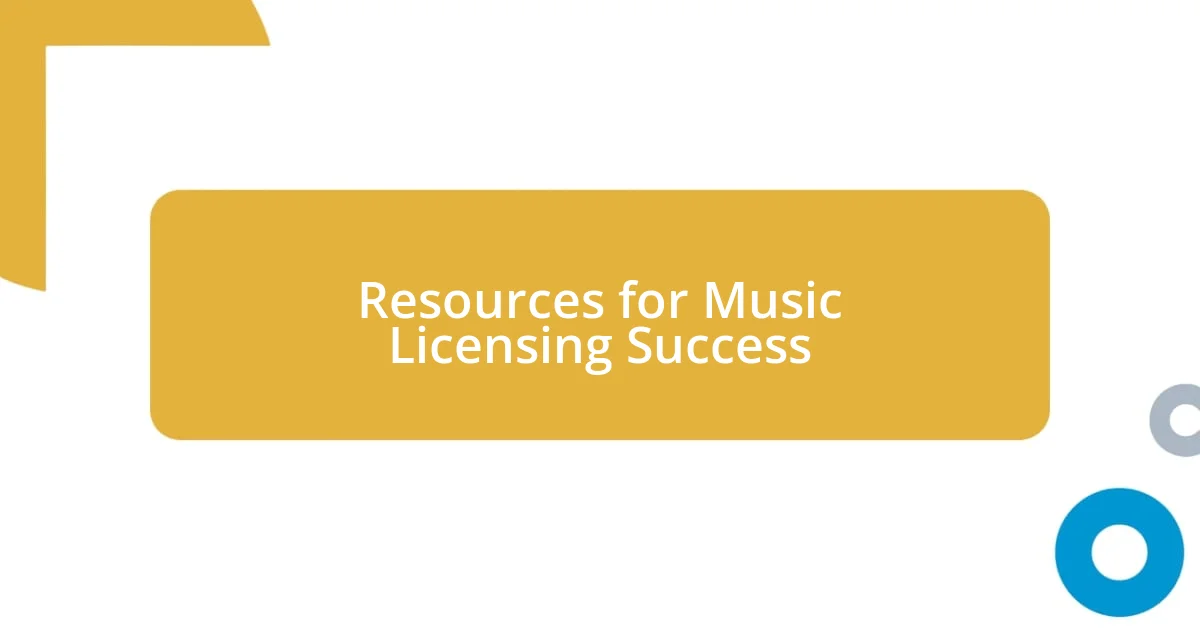
Resources for Music Licensing Success
Understanding the available resources can really make a difference in your music licensing journey. For instance, I stumbled upon several online platforms dedicated to licensing music. Websites like Songtradr and Musicbed not only offer a broad library of tracks but also provide clear licensing guidelines. Isn’t it a relief to have everything laid out in an organized manner? This clarity helped me avoid headaches and focus more on my creative process.
Networking can also be a game-changer. I remember attending a local music industry event and meeting a composer who generously shared his insights about navigating licensing issues. That connection not only led to fruitful collaborations but also provided me with firsthand tips and resources I hadn’t encountered before. Have you ever found that one conversation opens up a world of possibilities? Engaging with others in the industry can reveal resourceful shortcuts and creative ideas that make the licensing process feel less daunting.
Additionally, consider tapping into forums and groups online where professionals discuss their licensing experiences. There was a time I felt overwhelmed navigating the complexities of the licensing world. Joining a Facebook group specifically for music professionals became my lifeline. I found myself inspired by others’ stories and their willingness to share resources. I often ask myself, how can we grow without learning from each other? Surrounding yourself with like-minded individuals not only provides support but can also lead to new resource discoveries that enhance your licensing success.
